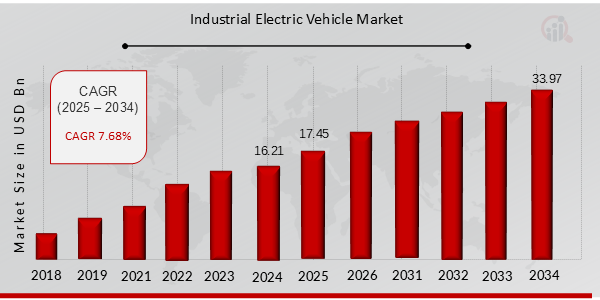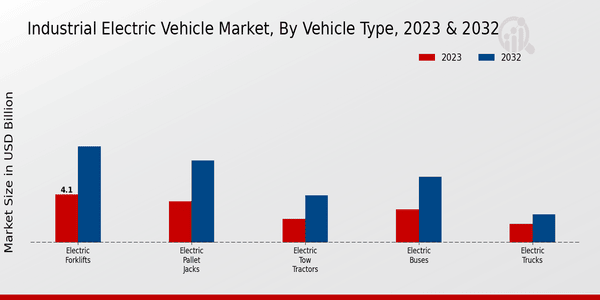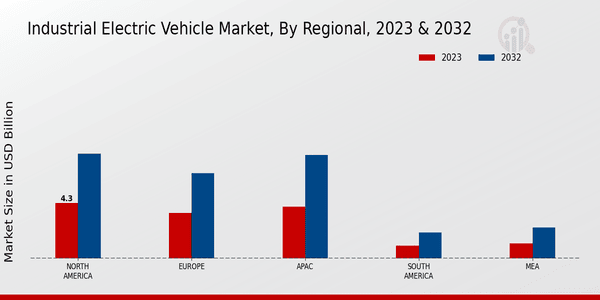Global Industrial Electric Vehicle Market Overview
As per MRFR analysis, the Industrial Electric Vehicle Market Size was estimated at 16.21 (USD Billion) in 2024. The Industrial Electric Vehicle Market Industry is expected to grow from 17.45 (USD Billion) in 2025 to 33.97 (USD Billion) till 2034, at a CAGR (growth rate) is expected to be around 7.68% during the forecast period (2025 - 2034)
Key Industrial Electric Vehicle Market Trends Highlighted
The Industrial Electric Vehicle Market is experiencing significant growth driven by several key factors. A noticeable shift towards sustainable practices and the increasing emphasis on reducing carbon emissions is encouraging industries to adopt electric vehicles. Governments across various regions are also implementing favorable policies and incentives that promote the use of electric vehicles, adding to the momentum.
The rising cost-effectiveness of electric vehicles compared to traditional fuel options is making them more appealing to businesses aiming to cut operational costs. As the market evolves, there are numerous opportunities to be explored. The increasing demand for logistics and transportation solutions presents a chance for manufacturers to innovate and develop more advanced electric vehicles tailored to specific industry needs. Additionally, growth in renewable energy sectors can lead to partnerships that enhance electric vehicle infrastructure. Companies can also look into battery technology improvements, driving further advancements in performance and efficiency.
In recent times, there has been a rising trend towards automation and smart technology in electric vehicles, aligning with wider industry shifts towards efficiency and digitalization. Integration of AI and IoT into vehicle operations is becoming more prevalent, enabling better fleet management and operational analytics. Furthermore, the development of charging infrastructure is gaining traction, addressing a critical barrier to widespread adoption. Electric vehicle manufacturers are focusing on creating versatile models that can serve various industrial applications, which is reshaping market dynamics and consumer expectations.

Source: Primary Research, Secondary Research, MRFR Database and Analyst Review
Industrial Electric Vehicle Market Drivers
Growing Environmental Concerns and Sustainability Initiatives
The Industrial Electric Vehicle Market is witnessing significant growth primarily driven by increasing environmental concerns and the need for sustainability. With the effects of climate change becoming more evident, businesses and consumers alike are recognizing the urgent need to reduce carbon emissions and transition towards cleaner energy sources. This shift is not only a response to regulatory pressures from governments aiming to meet their climate goals but also a reflection of changing consumer preferences that favor businesses with sustainable practices.
Industrial Electric Vehicles (IEVs) offer a viable solution by operating on electric power, which significantly reduces greenhouse gas emissions in comparison to traditional fossil fuel-powered vehicles. Additionally, many countries are implementing stringent emissions regulations, which, in turn, is driving companies to invest in electric vehicle technology. The Industrial Electric Vehicle Market Industry is benefiting tremendously from these macroeconomic factors as industries seek innovative ways to enhance their sustainability initiatives.
Ultimately, the drive towards a more sustainable future is not only engendering responsible business practices but also spurring technological advancements in the electric vehicle sector, which includes the development of more efficient batteries and charging systems. This has positioned the Industrial Electric Vehicle Market favorably for continued growth as both policymakers and corporations align with the worldwide shift towards electrification of transport. Furthermore, large industries across sectors like logistics, manufacturing, and construction are adopting electric vehicles to modernize their operations while adhering to their environmental commitments. This transformation is set to create a ripple effect throughout the market, prompting further innovation and encouraging collaboration among manufacturers, technology developers and supply chain stakeholders.
Technological Advancements and Innovations
Technological advancements play a critical role in the growth of the Global Industrial Electric Vehicle Market. With rapid innovations in battery technology, electric drivetrains and charging infrastructure, the operational efficiency and performance of electric vehicles are continuously improving. These advancements not only enhance the range and charging speed of industrial electric vehicles but also reduce overall costs, making them more attractive to businesses. Moreover, the integration of smart technologies, such as IoT and AI, facilitates better fleet management, predictive maintenance, and operational efficiencies, further driving adoption in the industrial sector.
Government Incentives and Support for Electric Vehicles
Governments worldwide are increasingly offering a range of incentives, grants and subsidies to promote the adoption of electric vehicles, fueling the growth of the Global Industrial Electric Vehicle Market. These initiatives include tax breaks, rebates, and grants, which reduce the financial burden on companies looking to transition to electric vehicle fleets. Such support not only makes it easier for industries to invest in electrification but also creates a favorable regulatory environment that encourages the use of electric vehicles in various sectors.
Industrial Electric Vehicle Market Segment Insights:
Industrial Electric Vehicle Market Vehicle Type Insights
The Global Industrial Electric Vehicle Market, particularly focusing on the Vehicle Type segment, has showcased a robust growth trajectory with diverse applications across various industries. In 2023, the market was valued at approximately 13.98 USD Billion, and it reflects the increasing demand for energy-efficient solutions in logistics and transportation. A significant fraction of this market share is held by Electric Forklifts, valued at about 4.1 USD Billion, which demonstrates their essential role in warehousing, manufacturing, and distribution sectors, where efficient material handling is crucial.
Following closely, Electric Pallet Jacks feature a valuation of 3.5 USD Billion, emphasizing their importance in the seamless movement of goods over short distances. These vehicles are essential in environments such as retail and grocery warehousing, ensuring quick and efficient operations. Electric Tow Tractors are also gaining attention with a market valuation of 2.0 USD Billion; they play a critical role in towing tasks within factories and airports, showcasing their versatility and the growing reliance on electric solutions for reducing carbon footprints.
Electric Buses have carved a niche in public transportation as the need for eco-friendly commuting options increases, leading to a market valuation of 2.8 USD Billion. Their adoption is spurred by government initiatives and technological advancements aimed at improving urban mobility and sustainability. Lastly, Electric Trucks, although currently valued at 1.58 USD Billion, are gradually making inroads into the logistics sector, driven by e-commerce growth and last-mile delivery demands, thereby demonstrating a noteworthy potential for future expansion. Collectively, these vehicle types illustrate a significant trend towards electrification in industrial applications, reflecting broader market evolution driven by sustainability and efficiency mandates, which is further supported by substantial Industrial Electric Vehicle Market revenue growth.
Hence, while Electric Forklifts and Electric Pallet Jacks dominate the landscape, the rising significance of Electric Tow Tractors, Buses and Trucks indicates a shift towards comprehensive electric vehicle integration in multiple facets of industrial operations. Overall, the segmentation of the Industrial Electric Vehicle Market data underscores the diverse needs of various industries, paving the way for an innovative future driven by cleaner transportation solutions.

Source: Primary Research, Secondary Research, MRFR Database and Analyst Review
Industrial Electric Vehicle Market Battery Type Insights
This segment of the market is primarily driven by the increasing need for efficient energy storage solutions. Among the leading options, Lithium-Ion Batteries dominate due to their high energy density and longevity, making them ideal for applications requiring consistent performance. Lead-acid batteries have been a traditional choice and continue to hold significant market share, primarily for cost-effectiveness in various industrial applications.
Nickel-Metal Hydride Batteries, while less common, provide a viable solution for specific use cases where safety and environmental concerns are paramount. Solid State Batteries, although currently in developmental stages, promise to enhance performance and safety in electric vehicles, projecting as a significant player in future market developments. The Industrial Electric Vehicle Market revenue is expected to witness substantial growth, influenced by advances in battery technology, sustainability initiatives, and increasing investments in electric vehicle infrastructure, paving the way for a diverse and competitive landscape.
Industrial Electric Vehicle Market End Use Industry Insights
Sectors such as Logistics and Warehousing show significant demand for electric vehicles, driven by the need for efficient, sustainable operations. Manufacturing also plays a crucial role as industries increasingly adopt electric options for material handling equipment to reduce emissions and operating costs. Construction activities benefit from electric vehicles due to their ability to provide eco-friendly alternatives to fossil fuel-powered machinery.
Additionally, the Retail sector is adapting as businesses seek electric vehicles for delivery purposes to enhance customer satisfaction while aligning with sustainability goals. This diverse landscape emphasizes the expanding application of industrial electric vehicles across multiple sectors, collectively shaping the overall market dynamics and contributing to the broader Industrial Electric Vehicle Market data. The market's growth is bolstered by the increasing emphasis on sustainability and regulatory support, positioning it for continued development amidst potential challenges related to infrastructure and technology adaptation.
Industrial Electric Vehicle Market Charging Infrastructure Insights
The Charging Infrastructure segment of the Industrial Electric Vehicle Market is a critical component, as it supports the growing adoption of electric vehicles across various industrial applications. The significance of charging options such as Standard Charging, Fast Charging and Wireless Charging cannot be overstated, as they cater to different needs and usage patterns within the industry. Fast Charging, in particular, plays a pivotal role in enhancing operational efficiency by reducing downtime for electric vehicles, making it increasingly vital for businesses that rely on quick turnaround times.
Meanwhile, Wireless Charging is gaining traction as a convenient solution, reflecting an important trend toward innovation in technology and user experience. The growth drivers for this segment include the increasing investments in charging infrastructure and governmental policies favoring electrification. However, challenges like the high costs of installation and the need for widespread integration with existing power grids persist. The overall data from the Industrial Electric Vehicle Market reveals a dynamic landscape characterized by evolving market trends, growth potential, and increasing opportunities for development.
Industrial Electric Vehicle Market Regional Insights
The Industrial Electric Vehicle Market is experiencing notable growth across various regions. In 2023, North America accounted for a significant portion of the market, valued at 4.3 USD Billion, and is expected to rise to 8.1 USD Billion by 2032, highlighting its majority holding in the overall market share. Europe follows closely with a valuation of 3.5 USD Billion in 2023, projected to reach 6.6 USD Billion in 2032, driven by stringent environmental regulations and a push towards cleaner technologies. The APAC region also plays a crucial role, valued at 4.0 USD Billion in 2023 and expected to increase to 8.0 USD Billion, supported by rapid industrialization and a rising demand for electric vehicles.
South America and MEA hold smaller shares, with valuations of 1.0 USD Billion and 1.18 USD Billion in 2023, respectively. However, both regions are set to expand, reaching 2.0 USD Billion and 2.4 USD Billion by 2032. The diverse growth dynamics across these regions present numerous opportunities as advancements in technology and increasing investments drive the market toward sustainability and efficiency. Market challenges, including infrastructure development and initial costs, remain active considerations for stakeholders in the Global Industrial Electric Vehicle Market.

Source: Primary Research, Secondary Research, MRFR Database and Analyst Review
Industrial Electric Vehicle Market Key Players and Competitive Insights:
The Industrial Electric Vehicle Market has been rapidly evolving, emerging as a significant sector within the larger electric vehicle landscape. Competitive insights in this market reveal that a variety of players are involved, each striving to innovate and capture market share through advancements in technology, production capabilities and sustainability initiatives. The increasing demand for environmentally friendly transportation solutions, driven by stricter regulations and growing consumer awareness, has intensified the competition among manufacturers.
Key factors influencing this landscape include technological advancements in battery efficiency, charging infrastructure development, and the commitment to reducing carbon footprints. As companies vie for leadership positions, strategic partnerships, mergers, and expansions are becoming common strategies to enhance market positioning. In the context of the Global Industrial Electric Vehicle Market, Toyota has reinforced its presence through an established reputation for reliability and innovation.
The company is recognized for its commitment to engineering excellence and sustainability, which has translated into a diverse portfolio of electric industrial vehicles. Toyota’s strengths lie in its advanced research and development capabilities, which enable it to integrate cutting-edge technology into its vehicles, improving energy efficiency and performance. Furthermore, the company benefits from its global supply chain, allowing for efficient production and distribution of its electric vehicles. Toyota's strategic focus on developing fuel-efficient electric and hybrid electric solutions positions it well in the competitive landscape of the industrial electric vehicle sector, appealing to environmentally conscious consumers and businesses alike.
General Motors has also made significant strides in the Global Industrial Electric Vehicle Market, leveraging its extensive experience in the automotive industry to transition towards electrification. The company has committed to investing heavily in electric vehicle technology and innovation, showcasing a strong portfolio that emphasizes sustainability and efficiency. A notable strength of General Motors is its robust infrastructure and supply chain management, which facilitate seamless production processes and product delivery. The company’s emphasis on integrating innovative battery technology and software solutions allows for the creation of high-performance electric industrial vehicles.
Additionally, General Motors is actively developing partnerships with various stakeholders to enhance charging networks and infrastructure, thereby supporting its customer base in the transition to electric mobility. This strategic direction positions General Motors favorably in the competitive landscape, enabling the company to meet the growing demand for reliable and efficient industrial electric vehicles.
Key Companies in the Industrial Electric Vehicle Market Include:
- Toyota
- General Motors
- Electra Meccanica
- Volkswagen
- Daimler
- Kalmar
- Ford
- Nissan
- Tesla
- Jungheinrich
- BYD
- Crown Equipment
- HysterYale
- ABB
- Proterra
Industrial Electric Vehicle Market Industry Developments
Recent developments in the Industrial Electric Vehicle Market have been largely influenced by significant advancements in technology and rising governmental support for sustainable transportation. Companies such as Toyota, General Motors, and Volkswagen have been increasing their investments in electric vehicle technologies, aiming to enhance their product offerings and comply with stricter emissions regulations. Notably, Tesla continues to lead with innovations in battery efficiency and autonomous driving features, while Daimler and Ford are expanding their electric vehicle portfolios in response to growing market demand. Mergers and acquisitions are also shaping the industry landscape, with companies exploring partnerships to leverage complementary technologies.
For instance, Kalmar and Proterra have focused on collaborating to enhance electric powertrains, and recent strategic initiatives from Nissan have signaled a consolidating industry. Growth in market valuation is evident across major players, buoyed by increasing consumer acceptance and sustainability trends, which is ultimately prompting companies like BYD and Crown Equipment to accelerate their delivery of electric industrial vehicles, thereby making a substantial impact on overall market dynamics.
Industrial Electric Vehicle Market Segmentation Insights
-
Industrial Electric Vehicle Market Vehicle Type Outlook
- Electric Forklifts
- Electric Pallet Jacks
- Electric Tow Tractors
- Electric Buses
- Electric Trucks
-
Industrial Electric Vehicle Market Battery Type Outlook
- Lithium-Ion Batteries
- Lead-Acid Batteries
- Nickel-Metal Hydride Batteries
- Solid State Batteries
-
Industrial Electric Vehicle Market End Use Industry Outlook
- Logistics
- Warehousing
- Manufacturing
- Construction
- Retail
-
Industrial Electric Vehicle Market Charging Infrastructure Outlook
- Standard Charging
- Fast Charging
- Wireless Charging
-
Industrial Electric Vehicle Market Regional Outlook
- North America
- Europe
- South America
- Asia Pacific
- Middle East and Africa
| Report Attribute/Metric |
Details |
|
Market Size 2024
|
16.21 (USD Billion)
|
|
Market Size 2025
|
17.45 (USD Billion)
|
|
Market Size 2034
|
33.97 (USD Billion)
|
|
Compound Annual Growth Rate (CAGR)
|
7.68% (2025 - 2034)
|
|
Report Coverage
|
Revenue Forecast, Competitive Landscape, Growth Factors, and Trends
|
|
Base Year
|
2024
|
|
Market Forecast Period
|
2025 - 2034
|
|
Historical Data
|
2019 - 2023
|
| Market Forecast Units |
USD Billion |
| Key Companies Profiled |
Toyota, General Motors, Electra Meccanica, Volkswagen, Daimler, Kalmar, Ford, Nissan, Tesla, Jungheinrich, BYD, Crown Equipment, HysterYale, ABB, Proterra |
| Segments Covered |
Vehicle Type, Battery Type, End Use Industry, Charging Infrastructure, Regional |
| Key Market Opportunities |
1. Growing demand for eco-friendly solutions, 2. Advances in battery technology, 3. Expansion of charging infrastructure, 4. Government incentives and regulations, 5. Rising automation in logistics and warehousing |
| Key Market Dynamics |
1. rising environmental regulations, 2. technological advancements in batteries, 3. increasing demand for automation, 4. growing cost-competitiveness, 5. expanding charging infrastructure |
| Countries Covered |
North America, Europe, APAC, South America, MEA |
Frequently Asked Questions (FAQ) :
The Industrial Electric Vehicle Market is expected to be valued at 33.97 USD Billion by the year 2034.
The market is anticipated to grow at a CAGR of 7.68% from 2025 to 2034.
North America is projected to hold the largest market share, valued at 8.1 USD Billion by 2032.
Electric Forklifts are projected to reach a market value of 8.2 USD Billion by 2032.
Key players include Toyota, General Motors, Volkswagen, Tesla, Ford, and several other prominent manufacturers.
The market size for Electric Pallet Jacks is expected to be valued at 7.0 USD Billion by 2032.
In 2023, the APAC region is valued at 4.0 USD Billion within the Global Industrial Electric Vehicle Market.
Electric Trucks are expected to reach a market size of 2.4 USD Billion by the year 2032.
Electric Buses are valued at 2.8 USD Billion in the year 2023.
The South America region is expected to grow to a market value of 2.0 USD Billion by 2032.

















